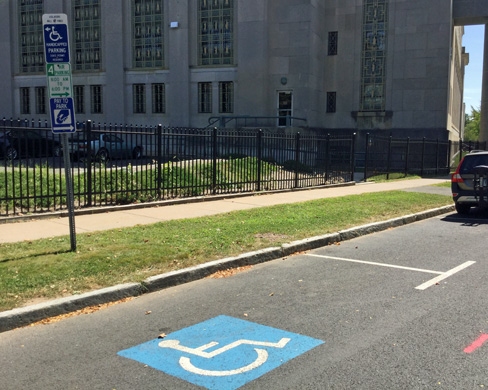By Cyrus Dos Santos – September 1, 2017
HARTFORD, CT — The capital city will no longer offer free metered parking for commuters with disabilities starting today.
But the head of the Hartford Parking Authority said it’s not about increasing revenues for a city flirting with bankruptcy.
“It’s too difficult to determine if a valid permit is used validly,” Hartford Parking Authority CEO Eric Boone said Wednesday. He also stated that current laws make enforcing violations extremely difficult.
According to a Hartford Parking Authority website, one in six vehicles at a meter displays an accessible parking permit. The website goes on to say this indicates that “there is a significant amount of permit abuse.”
Asked if this change is related to the current financial climate within the capital city, Boone stated that it is to improve accessibility.
“Is there a small bi-product here, yeah, probably,” Boone said, “but that’s definitely not our catalyst here.”
He said they are interested in making sure valid permit holders have accessibility. Making sure everyone pays may deter those looking to avoid paying a parking meter and give those who truly need it more accessibility.
For valid permit holders “their need is accessibility,” he stated.
According to the Department of Motor Vehicles, there are 6,022 accessible parking permits in Hartford. That number is less than five percent of the 238,903 total state permits distributed by the agency, and far less than the 16.7 percent statistic HPA is using as it’s basis to remove this parking benefit.

Dating back to former Hartford Mayor Pedro Segarra’s administration, HPA set out to survey the area to address suspected abuse, Boone said.
HPA estimated that at any given time approximately 7 percent of metered cars in the downtown area should display an accessible parking permit, legally. This number was arrived at after searching publicly available statistics addressing the number of disabled citizens who are at least the legal driving age, as well as DMV qualifications for permits. They also used the total number of assigned permits within the state based on DMV records and the Census.
“More than half of the handicapped parkers are fraudulent,” Boone asserted.
Without proper documentation of individual violations “there’s no way to know whether the person assigned the permit lives in that municipality or another,” William Seymour, DMV chief of staff, said. “Their permit is issued to a person, not a vehicle.”
But, with speculation of an excessive use of accessible parking permits, Seymour insists that DMV permits are issued in accordance with the law.
“We ensure that the proper medical certification is given for the permit,” Seymour said. “After that point, it’s a police issue.”
After consulting other municipalities, including Philadelphia, Chicago, and Atlanta to name a few, as well as the Office of Protection and Advocacy for Persons with Disabilities, HPA believes this is the best choice for the city to move forward, Boone said.
“We don’t want to add an undue burden on the disabled community,” Boone said.
The alternative, according to HPA, would be to follow a model adopted by Michigan, which creates a two tiered parking system for disabled commuters.
This approach would call for tighter restrictions on those issued an accessible parking permit, resulting in a longer, more discriminatory process.
“We chose the least intrusive path,” Boone said.
Leading up to the change, HPA launched a bilingual flyer campaign that started in July and will continue past the start date. The organization has issued 10,000 flyers to be placed on all metered windshields displaying an accessible parking permit.
There will be warnings issued for the first week. After that, citations will be issued.
In Hartford, failing to pay a meter is a $45 fine, and going over the metered time limit is a $25 fine.